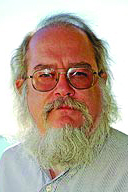
Donald Olson, a University of Miami professor and physical oceanographer, has lived a life of adventure. Before becoming a professor at UM, he went on expeditions at sea, exploring the corners of the world from India to Antarctica.
Ranches in Wyoming, Olson’s birthplace, are not exactly breeding grounds for marine scientists, but Olson said Wyoming does have a tie to the ocean: it used to be covered by the ocean 65 million years ago during the Mesozoic Era, a period in earth’s history often known for the abundance of reptiles and dinosaurs.
“There are 20 miles of Mesozoic beach exposed in Wyoming. I would spend my Saturdays roaming through the hills with my rifle and my rock hammer,” Olson said. His ranch was surrounded by Mesozoic seafloor, and he would search for and excavate fossils from the ground, finding ancient remnants of oysters and belemnites, ancestors of modern squid. He discovered rippling patterns in rock created by ancient ocean flows. Olson said he even came across the tracks of an Allosaurus, a dinosaur from the Jurassic period, along prehistoric beach rock.
The ancient seafloor served as a classroom for Olson as a child. By eighth grade, he knew that he wanted to be a physical oceanographer. Physical oceanography is a subdomain of oceanography that focuses on the physical conditions and processes in the ocean.
“He is extremely good at what he does. He has so much passion for learning and teaching and has devoted his life to learning more … and conveying what he learns to others,” senior Keenan Berry said. “Since he is so intelligent in his field, he has teamed up with so many interesting groups, who all want him for his expertise.”
Olson has participated in many worldwide meetings funded by the U.S. State Department and organized by the U.S. Navy, including planning research cruises and collaborating with the Pakistani and Indian Institutes for Ocean Science (IOS).
One of these meetings was in early 2002, when he travelled to Pakistan to plan a set of Pakistani cruises to coincide with a major U.S. and German research program in the Arabian Sea. After that meeting, he travelled to Goa, India to celebrate the 50th birthday of the Indian IOS and to give talks throughout the country for two weeks, reviewing Indian oceanography.
However, he ended up not being able to give a single presentation. The second Persian Gulf War (better known as the Iraq War), which started when Saddam Hussein refused to step down from power, began on Olson’s first night in India – his scariest experience as an oceanographer, he said. After two weeks in India, the Navy flew Olson back to the U.S. in the interest of safety.
Olson found himself in many other dangerous, even life-threatening situations throughout his career. He crossed the Arabian Sea twice at the peak of a monsoon, enduring 45-mile-per-hour winds. “I once traveled from one ship to another in a 16-foot boat in over 20-foot seas,” he said.
These situations did not deter Olson from spending as much time at sea as possible. As a graduate student at Texas A&M University, he spent nearly six months at sea in one year. Olson has been on cruises in every ocean except for the Arctic. He has spent months in the Atlantic and has been to Antarctica twice.
“Your feet get cold, but that’s it,” Olson said of Antarctica.
On cruises, Olson closely observed many birds, seals and whales that would normally be inaccessible.
“I spent an entire night calibrating current meters [a device to measure ocean flows] with a bunch of elephant seals,” Olson said.
After a career for the storybooks, Olson spends his time teaching and advising undergraduates at UM, a move he said he thoroughly enjoys.
“Whenever he brings up a concept but does not have time to go into detail about it, he says to come to his office after class so he can show you a paper or work out a problem with you. You can tell that he really wants his students to learn,” senior Kevin Rodriguez said.
Although Olson said he does not plan on retiring any time soon. He also said that if he does retire someday, he wants to return to where it all started in Wyoming and spend his days looking at fossils.
Olson teaches Physical Oceanography (MSC 301) in the fall semester and will be teaching Reconstruction of Ancient Seas (MSC 372) in the spring.
Correction, Nov. 10, 2015: This article originally stated that Olson spent six consecutive months at sea in one year.





